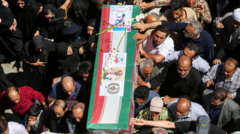In a turbulent aftermath of a recent 12-day conflict with Israel, the Islamic Republic of Iran is caught between the potential for change and the harsh reality of its weakened state. The U.S. briefly entered the fray, raising questions about the future trajectory of a nation deeply entrenched in turmoil.
Conflict in Iran: A Nation at a Crossroads

Conflict in Iran: A Nation at a Crossroads
As Iran faces post-war struggles, the future of the Islamic Republic hangs in the balance.
On Tuesday, as Tehran stirred with the news of a cease-fire, echoes of conflict reverberated in the minds of many Iranians. Roxana Saberi, a dual Iranian-American journalist, poignantly recalled her past experiences of incarceration in Iran, feeling the weight of her memories pressing down amid the current crisis. The bombings, including those targeting the infamous Evin prison, rekindled fears for friends and family left behind while she grappled with her hopes for change within her homeland.
The ongoing military clashes may have briefly jeopardized the clerical regime, which has long championed uranium enrichment as a symbol of national pride. Despite aspirations for liberation, the nation faces a grim economic outlook and a challenging political landscape, with President Masoud Pezeshkian labeling the current moment as a “golden opportunity for change.” Yet, caution prevails, as the recent war has underscored the fragility of the state.
The complex reality entails a web of deceit and foreign espionage, with the highest echelons of Iranian politics apparently infiltrated by Israel's intelligence services. All eyes remain fixed on Iran's supreme leader, Ayatollah Ali Khamenei, whose position remains unchallenged despite the war's turmoil. Prime Minister Benjamin Netanyahu's bold proclamation that the end of Khamenei would lead to resolving the conflict looms ominously over the regional landscape, further complicating the prospect of a return to peace.
Amidst this volatile backdrop, a population once yearning for liberation now grapples with uncertainty. With hopes for reform battling against the oppressive realities of authoritarian rule, Iran stands at a critical juncture. The international community watches closely as this complex narrative of aspiration and despair unfolds, marking a defining chapter in the Islamic Republic's storied history.
The ongoing military clashes may have briefly jeopardized the clerical regime, which has long championed uranium enrichment as a symbol of national pride. Despite aspirations for liberation, the nation faces a grim economic outlook and a challenging political landscape, with President Masoud Pezeshkian labeling the current moment as a “golden opportunity for change.” Yet, caution prevails, as the recent war has underscored the fragility of the state.
The complex reality entails a web of deceit and foreign espionage, with the highest echelons of Iranian politics apparently infiltrated by Israel's intelligence services. All eyes remain fixed on Iran's supreme leader, Ayatollah Ali Khamenei, whose position remains unchallenged despite the war's turmoil. Prime Minister Benjamin Netanyahu's bold proclamation that the end of Khamenei would lead to resolving the conflict looms ominously over the regional landscape, further complicating the prospect of a return to peace.
Amidst this volatile backdrop, a population once yearning for liberation now grapples with uncertainty. With hopes for reform battling against the oppressive realities of authoritarian rule, Iran stands at a critical juncture. The international community watches closely as this complex narrative of aspiration and despair unfolds, marking a defining chapter in the Islamic Republic's storied history.




















